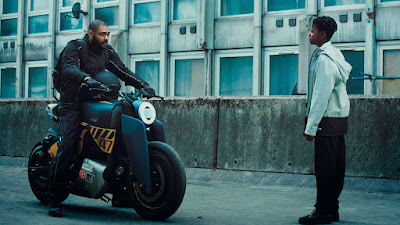
Acclaimed actor Daniel Kaluuya (JUDAS AND THE BLACK MESSIAH) turns his hand to writing and directing in partnership with Joe Murtagh (AMERICAN ANIMALS) and Kibwe Tavares respectively. Together they have crafted a film that is superficially a dystopian political nightmare about gentrification and police brutality. But it soon becomes apparent that the film's real themes are of fatherhood and community.
The film takes place in The Kitchen - the last piece of social housing in London. The government wants the residents cleared out so that they can build luxury flats instead, and when the residents refuse to leave they are punished by having their utilities cut off and periodic brutal police raids. Against this backdrop we meet Izi - a cynical man desperate to leave The Kitchen for luxury housing but constrained by the sudden appearance of a young boy called Benji who may be his son. What are the stakes of this film? At first we think they are whether Izi will have the money to move out. Then we think it's going to be a struggle for Benji's future - on the straight and narrow with Izi or joining a biker gang.
Part of my problem with this film is that actually the dystopian future idea is never particularly well fleshed out. We are just meant to understand - instinctively - as contemporary Londoners - that the housing situation is rigged. Maybe we do - but will global audiences? My second issue is that there are literally zero female characters that matter. In 2023. In a progressive, politically aware film. Seriously? I guess the writers might say that this is because the entire point of the film is to focus on fatherhood, and that its key narrative arc is a selfish man taking on that responsibility. Maaaaybe. Overall, the film just feels underwritten and lugubrious. I enjoyed the creation of The Kitchen in the first hour but very little actually happened. As I said, I could and did enjoy derping around with these characters for a while. I really enjoyed the more informal banter about cardamom flavoured pancakes and Hawaiian dancer lamps. But at some point we need to get out of The Shire.
In front of the lens, Kane Robinson/Kano (Top Boy) shows little range as Izi, playing him as looking conflicted and staring into the middle distance all the time. He doesn't have much help from a script that makes him taciturn so this role needed some good, nuanced facial acting and we just didn't get it. We are on far more impressive ground with Jedaiah Bannerman, who is both heart-breaking and hilarious as Benji. He is an actor to watch. I will also confess that I got a thrill from seeing Ian Wright playing the voice and heart of The Kitchen, a DJ who spins classic vinyl while preaching solidarity. As a Gooner, I could happily watch hours of Wrighty vibing along to classic tracks. I am pleased and relieved to say that this is no cheap cameo either: Lord Kitchener is the emotional heartbeat of the plot.
Behind the lens, production design did wonders with what I suspect was a small budget. I loved the grungy, vibrant, rotting, exciting, space of The Kitchen. It felt real somehow, and something worth fighting for, which is really important. This also felt disturbingly like the present - maybe because the budget to do anything too radical wasn't there - maybe because the film-makers were making a point - maybe because I am so familiar with the shooting locations I knew exactly where they were. Isn't it funny how people wanting to create the future always come back to my beloved brutalist notorious Barbican Centre? I also really loved the aural landscape of this film - the richness and diversity of hearing a cappella gospel; bass-thumping EDM; and classic tracks from Lord Kitchener. But films start and end with scripts and this one needed another pass.
THE KITCHEN has a running time of 104 minutes, is rated R, and will be released on Netflix in 2024.

No comments:
Post a Comment